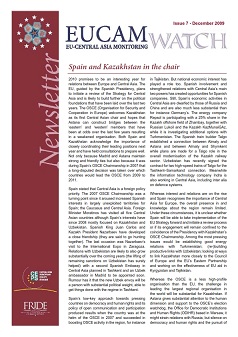Spain and Kazakhstan in the chair
Spain and Kazakhstan in the chair
Author(s): Jos Boonstra, Nicolas de Pedro, Nafisa Hasanova, Gulnura Toralieva, Nargis Kassenova, Aigerim Duimagambetova, Luis Felipe Fernández de la Peña
Contributor(s): Jos Boonstra (Editor), Michael Emerson (Editor), Nafisa Hasanova (Editor), Aigerim Duimagambetova (Editor), Anne Harrington (Editor), Jackie West (Editor)
Subject(s): Governance, Environmental and Energy policy, International relations/trade, Geopolitics
Published by: CEPS Centre for European Policy Studies
Keywords: European Union; Central Asia; Kazakhstan; foreign policy; international relations, Spanish presidency; energy policy;
Summary/Abstract: 2010 promises to be an interesting year for relations between Europe and Central Asia. The EU, guided by the Spanish Presidency, plans to initiate a review of the Strategy for Central Asia and is likely to build further on the political foundations that have been laid over the last two years. The OSCE (Organisation for Security and Cooperation in Europe) welcomes Kazakhstan as its first Central Asian chair and hopes that Astana can construct bridges between the ‘eastern’ and ‘western’ members that have been at odds over the last few years resulting in a weakened organisation. Both Spain and Kazakhstan acknowledge the importance of closely coordinating their leading positions next year and have held consultations to prepare well. Not only because Madrid and Astana maintain strong and friendly ties but also because it was during Spain’s OSCE Chairmanship in 2007 that a long-disputed decision was taken over which countries would lead the OSCE from 2009 to 2011.
Series: EUCAM Watch
- Page Count: 8
- Publication Year: 2009
- Language: English
- Content File-PDF

